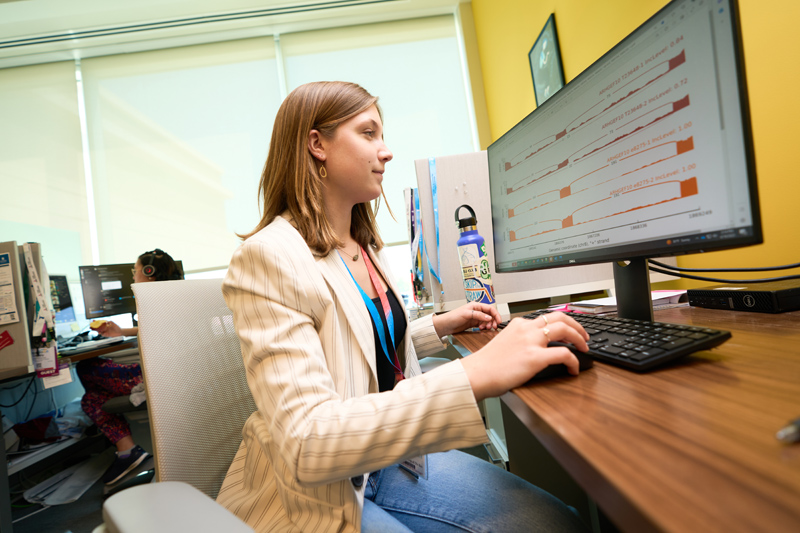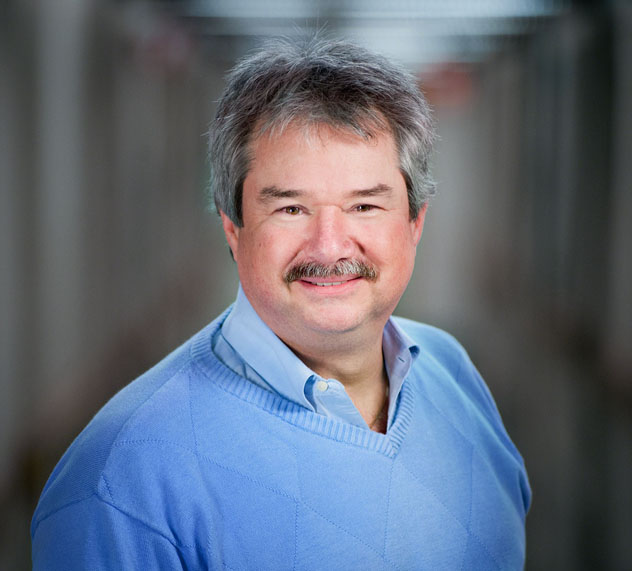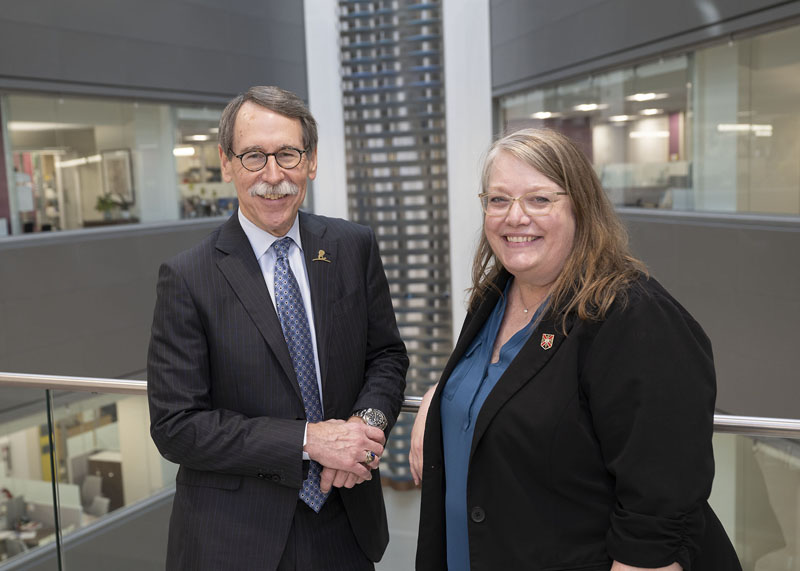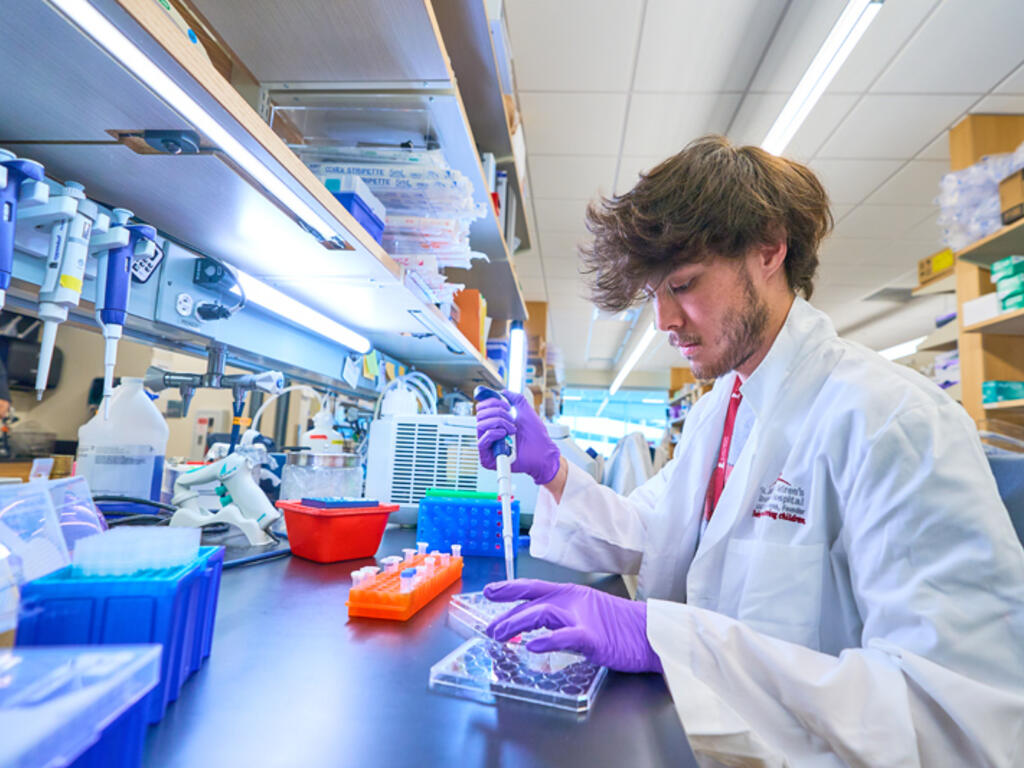By Samuel X. Cicci '15
From biomathematics to biology, a longstanding partnership between Rhodes and St. Jude Children's Research Hospital provides students a window into world-class research and scientific advancement with real-world applications.
As Christopher Hom ‘24 began his internship studying sonic hedgehog pathways at St. Jude Children’s Research hospital last summer, an unrelated lecture that the hospital planned to host caught his eye. One lecture turned into several, and before he knew it, Hom had absorbed everything from cancer biology programs to a breakdown of St. Jude’s recent efforts at rendering aid in Ukraine. Such access to a font of cutting-edge cancer research was simply too good an opportunity to pass up, especially when in service of finding cures or advancing treatment for pediatric catastrophic diseases.
Hom was enrolled in the St. Jude Summer Plus program, in which Rhodes students pursue an extensive research curriculum over the course of two summers and the intervening academic year. And the biochemistry and molecular biology and economics dual-major planned to make the most of his time. “I’d started working in the lab of Dr. Stacey Ogden, and I realized that there were probably two dozen presentations every week covering every facet of the hospital,” recalls Hom. “So outside of the research I was doing, I started attending as many of those as I could.” Hom, and many other students before him, have had the privilege of conducting research alongside world-class doctors and facilities thanks to Rhodes’ multi-decade partnership with St. Jude.
“This partnership is incredible because we do so many different things that strengthen experiences that Rhodes students have by intersecting them with researchers and faculty over at St. Jude,” says Dr. Mary Miller, chair of biology at Rhodes College and director of the partnership. “And in turn, St. Jude researchers intersect with our students and strengthen their own experiences. It’s a relationship where all parties benefit and enrich each other.”

The official partnership between Rhodes and St. Jude is currently in its 22nd year, and has grown exponentially since its inception. The arrangement came about as an agreement between Rhodes’ 19th president, William Troutt, and former St. Jude director and CEO Dr. Bill Evans. And 22 years on, the commitment to maintaining the professional and academic ties between the two institutions remains strong. “Rhodes is profoundly grateful for its longstanding partnership with St. Jude,” says President Jennifer Collins. “The opportunity our students have to participate in St. Jude’s groundbreaking research is truly extraordinary, and it helps launch our students into exciting careers in the health and STEM fields.”
The Summer Plus program has long been the flagship experience of the partnership. Students in their first, second, or third years may tour St. Jude and meet with several principal investigators to learn about various research projects. St. Jude mentors and students are then paired together based on shared interests. Students are paid for their 12 weeks of full-time work throughout the summer and have housing provided by Rhodes. Once the academic year begins, students work for 10 hours a week, and then resume their full-time schedule the following summer. The Summer Plus program also provides students with two class credits per semester, in addition to the F11 Foundation requirement. And the program culminates in a research presentation at a local, regional, or national conference.
St. Jude welcomed six students in the inaugural Summer Plus program. Several of those individuals worked in the molecular pharmacology lab of Dr. Linda Harris, who is now St. Jude’s director of postdoctoral talent acquisition. “I remember hosting one of the first cohorts of students that we had here,” says Harris, “and they just blew us all away. They came in well-prepared from the undergraduate courses they were taking, paid close attention to instructions, and did an amazing job in the lab. Ever since then, whether they’re doing cell culture work or protein purification, they’re always up for the challenge.”
Over the past two decades the program has continued to expand, with this year’s program seeing 20 students conducting research at St. Jude. Including next summer’s cohort, says Miller, the total number of students who have been enrolled in the Summer Plus program will reach 209 students. “We’ve been incredibly impressed with the students from Rhodes and their participation in the Summer Plus program,” says Dr. James Downing, president and CEO of St. Jude. “By using the opportunity to work alongside our scientists and conduct research in world-class facilities, these students are taking an important step in becoming the scientific workforce of the future. We have enjoyed mentoring these remarkable young researchers over the years.”
Other colleges and universities have their own summer programs with St. Jude, but Rhodes’ proximity allows students unprecedented access and familiarity with St. Jude’s laboratories and facilities. “With one of our other programs, students come in to do their research, and then they leave,” says Dr. Gerry Zambetti, a longstanding member of St. Jude’s faculty. “So they leave, and maybe come back the next year, but they have to re-learn protocols and get back up to speed. For Rhodes students, they’re always ready, they’re familiar with the project, they hit the ground running and they’re working on the project all year long, fully immersed.”
For biomathematics major Helen Pennington ‘24, a lifelong passion for helping others made pursuing a career in medicine a simple choice. When it came time to pick a college, Rhodes’ partnership with St. Jude brought her to Memphis. “The Summer Plus program was a big reason why I chose Rhodes,” she says. “St. Jude is so renowned, and when I saw we had the opportunity to conduct research there, it really solidified my choice.”

Pennington has spent her time studying pediatric epilepsy with Dr. Heather Mefford, using patient DNA to find disease-causing variants via bioinformatics. Wading into the complexities of biological data analysis may have been tough to learn on the fly, but Pennington came prepared, having picked up plenty of coding experience thanks to mentoring from her academic advisor at Rhodes, Dr. Erin Bodine. “She’s taken a lot of time to help teach me coding, taught me a lot about the research process, and I’m publishing a paper with her this year, too. That really gave me a full picture of what I would be doing at St. Jude and prepared me for the opportunity.”
While many students head to St. Jude to pursue their research projects, the partnership also sees plenty of St. Jude researchers headed the other way. Several of the hospital’s postdoctoral fellows are invited to campus and give research presentations as part of the Cutting Edge Seminar Series; different departments host different lectures, so presentations can cover anything from molecular biology to chemistry. Even if students aren’t participating in the Summer Plus program, they still have open access to all kinds of new research and innovations by attending such seminars. Meanwhile, Rhodes faculty will work with the researcher ahead of time to help tailor the presentation to the right level for undergrads.
For some of those students, it will be no surprise to run into a few of the postdoctoral fellows later on in the classroom. “One of our goals is to provide an opportunity for these postdocs to teach an upper-level course here at Rhodes, called Topics in Biomedical Science,” says Miller. “It’s run by a Rhodes faculty member who mentors the fellows as they teach the course.” Leading a curriculum is a powerful training opportunity for St. Jude researchers, who work closely with Rhodes faculty to learn syllabus and exam design, classroom engagement techniques, and many other crucial aspects of high-impact undergraduate instruction. After time spent in a Rhodes classroom, some fellows catch the teaching bug and want to continue sharing their experience with students. One former postdoctoral fellow who taught a class is Ann Viano, now an associate professor of physics at Rhodes who also led the program for many years. And the enthusiasm to teach such a class is shared by many of her peers.

“I taught one such cancer biology class,” adds Zambetti, “and I can’t tell you how exciting it is to be in the classroom. There’s this satisfaction that many of us get when we get to help train the next generation of researchers. And for many of our fellows, it’s an invaluable learning experience for them.”
The partnership between the two institutions is always growing. For example, a monthly organizing committee is working to leverage St Jude’s global reach after a COVID-induced hiatus and is always seeking to enrich the experience for both sides. On Rhodes’ side, Drs. Miller, Katie Welsh, and Larryn Peterson work with St. Jude Drs. Zambetti, Harris, and Sally McIver and predoctoral program coordinator Chris Cotton. The committee members help select students and faculty who will benefit from the partnership and are looking at ways to expand the program. “There are just so many ways that our two organizations can intersect,” says Miller. “We have student volunteers who want to help out at St. Jude and we have majors from outside the sciences who can find a position at St. Jude and be part of the mission. It’s just such a huge benefit to us both, and we’re really excited for what the future holds.”
“It’s really grown to a point where interest among St. Jude faculty has skyrocketed,” says Harris. “So many members want to accept students into their lab year after year. I think it shows how valuable these students are and how much they can benefit our team here.”
For the current Summer Plus members, there are only a few months left before their time comes to a close; however, St. Jude has left an indelible impression on them. “It’s not just that you’re able to learn so much,” says Hom. “it’s that so many of the faculty members at St. Jude are excited to teach you, and they really want you there. We’re learning cutting-edge research techniques before they come up in the classroom. I can’t stress enough that this is one of the best opportunities I’ve been presented with in my Rhodes experience.”
“For my part, my lab is looking at conferences where I may be able to present,” says Pennington. “And it’s so exciting to be able to share what I’ve been working on. St. Jude and Rhodes are really intentional about pairing you with the program that you’re most suited for. And you can surprise yourself when you look back and see just how much you’ve learned, and just how much you’ve accomplished.”

